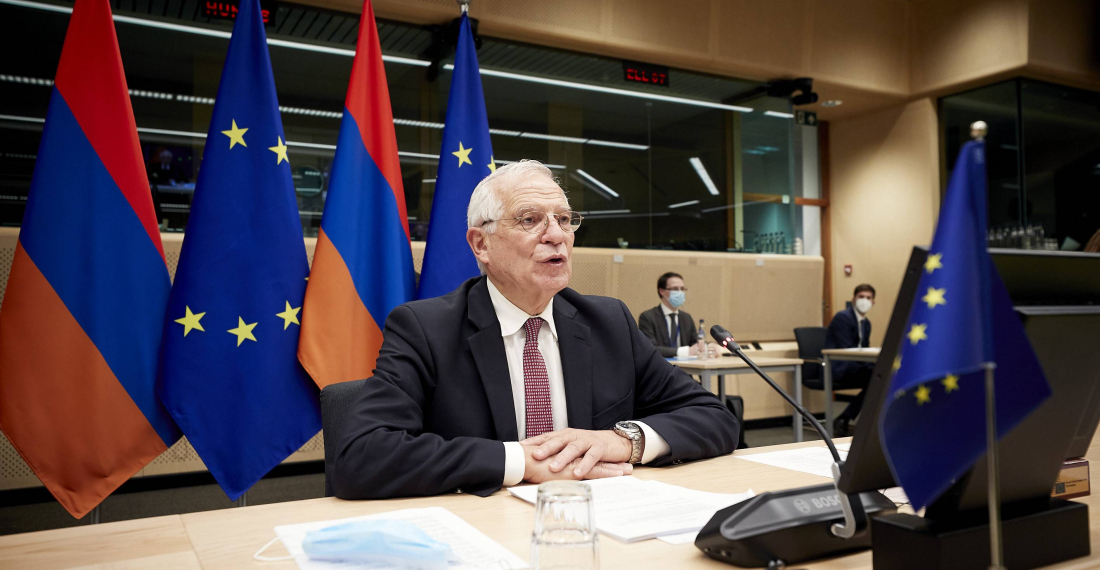There are signs that the European Union will be stepping up its engagement on issues related to the Karabakh situation. Brussels this week is hosting the foreign ministers for Armenia and Azerbaijan for separate discussions in the framework of the respective partnership councils.
"The EU stands ready to assume a role in supporting and shaping a durable settlement to the Nagorno Karabakh conflict, in close complementarity with the Minsk Group Co-Chairs. We are ready to use our peacebuilding and reconstruction tools to support this", said EU High Representative, Josep Borrell in the meeting with the Armenian Foreign Minister Ara Ayvazyan on Thursday, 17 December.
A meeting with the Azerbaijani foreign minister will be held today.
The 3rd Partnership Council meeting between the European Union and the Republic of Armenia chaired by Borell was also attended by EU Commissioner for Neighbourhood and Enlargement, Olivér Várhelyi. Foreign Minister Mr Ara Ayvazyan led the Armenian delegation.
A statement issued in Brussels said that "the Partnership Council reviewed the implementation of the EU-Armenia Comprehensive and Enhanced Partnership Agreement (CEPA), which covers a wide range of cooperation in the political, economic, trade, and other sectoral areas. It also discussed other issues relevant for EU-Armenia relations. The EU reiterated that it remains fully committed to the joint agenda as well as to supporting Armenia in overcoming challenges on its reform path.
The Partnership Council also addressed the challenges posed by the COVID-19 pandemic, underlining the EU's support to Armenia’s efforts protect lives and livelihoods, and to reopen societies and the economy.
The EU and Armenia also discussed the situation in and around Nagorno-Karabakh following the cessation of hostilities on 10 November 2020, the EU's role in supporting recovery and reconciliation, as well as regional issues.
"The EU welcomes and supports Armenia's strong commitment to further pursue its reform agenda and to fully implement our bilateral agreement, despite the challenges the country is confronted with", said High Representative, Josep Borrell. "The EU stands ready to assume a role in supporting and shaping a durable settlement to the Nagorno Karabakh conflict, in close complementarity with the Minsk Group Co-Chairs. We are ready to use our peacebuilding and reconstruction tools to support this."
Commissioner for Neighbourhood and Enlargement, Olivér Várhelyi, underlined that "The EU is strongly committed to support Armenia's socio-economic recovery and continued domestic reforms for the benefit of the Armenian citizens and businesses. With substantial assistance already provided to mitigate the impact of the COVID-19 pandemic and the government's priority reforms in justice and police, we stand ready to explore how to further support Armenia under the current challenging circumstances. We are also ready to contribute €10 million to further humanitarian assistance and to work towards more comprehensive conflict transformation and longer-term socio-economic development."
Ahead of the Partnership Council, the European Union issued a report on developments in Armenia and EU-Armenia relations since May 2019. The report underlines Armenia's progress in implementing the EU-Armenia Comprehensive and Enhanced Partnership Agreement, its commitment to domestic reforms, and the key role of the EU in supporting them.
The EU-Armenia Partnership Council took place one day ahead of the EU-Azerbaijan Cooperation Council.
"These meetings reiterate the importance of the EU's partnership with the countries in the region and the EU’s support to its recovery and to sustainable peace.", the statement concluded
source: commonspace.eu with the press service of the European External Action Service
photo: EU High Representative Josep Borrell at the EU-Armenian Partnership Council in Brussels on 17 December 2020 (picture courtesy of the press service of the Armenian Foreign Ministry)







